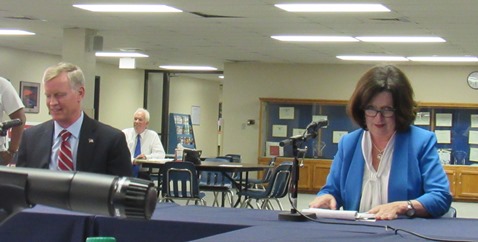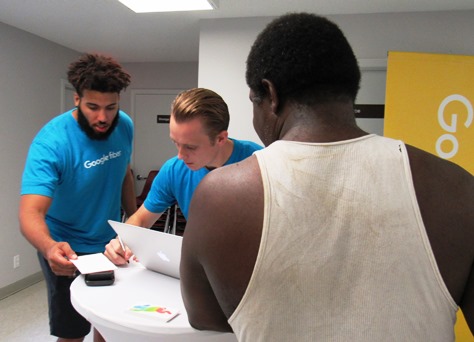Running for state representative, 36th District, are incumbent Rep. Kathy Wolfe Moore, a Democrat, and Kevin Braun, a Republican. The other state representatives here are unopposed.
Rep. Wolfe Moore has served as a state representative since 2011 and is the business director for the University of Kansas Hospital in Kansas City, Kan. She is a former chief of staff for former Mayor Carol Marinovich. A lifelong resident, she has served on the Livable Neighborhoods task force, a former member of the St. Patrick’s school board, is currently the chair of the Wyandotte Economic Development Council, serves on Healthy Communities Wyandotte and is a member of the Wyandot Center, Mental Health Center board in Wyandotte County.
Braun said he was a lifelong conservative, with 30 years experience in business. He has worked for Fortune 500 companies. He is a U.S. Army veteran with two overseas deployments. He has a master’s degree in business law from Friends University, and has been a Kansas resident since 1998. He has not previously run for office.
At a candidate forum on Oct. 17 sponsored by Business West, Kansas City Kansas Community College and other local nonprofits, several differences were noted between the 36th District candidates’ positions on the issues.
About the state budget, Rep. Wolfe Moore said because of the governor’s unfair tax scheme that destroyed the budget, killed jobs and lowered the state’s credit rating several times, the damage has been done to schools, mental health, highways and pensions.
“We need more common-sense moderate legislators, who are willing to put politics aside and do the right thing,” Rep. Wolfe Moore said. She said she has a reputation for working across party lines, and always putting policy ahead of politics.
She said the 2012 tax plan is draining the budget and causing it to be unbalanced year after year. There have been significant cuts to schools and highways, she said. She said the tax plan needs to be fixed. Currently, money is simply being given away to LLCs that were formerly taxed.
Braun said the Legislature isn’t going to change in the next election. What is needed is to send a conservative to work with conservatives to bring back to the 36th District what it deserves, he said. “I would love to go to Topeka and work with the people there in a positive way,” he said.
He added he was not an apologist for those in office who made the previous decisions. He said he favors supporting small businesses with proper tax regulation. There probably should be some small areas where changes are needed, “but to say we’re going to repeal everything and put it back on small businesses, … that’s unacceptable,” he said.
Rep. Wolfe Moore said she voted last year to rescind the LLC business loophole, because that would raise about $250 million, to help close the budget hole, and it’s a matter of fairness. “Everyone should have to pay for the upkeep of highways, or schools, or mental health. There shouldn’t be a few selected people who don’t have to pay that fee.”
She said she understands trying something new, but when it doesn’t work, it’s time to take a different direction. The conservatives and leaders have been unwilling to take a different direction, which is irresponsible, she said.
“The last thing we need in this election is another conservative who will side with them and will side with the governor,” Rep. Wolfe Moore said.
She said legislators need to come up with a new school funding formula, and she favors any program that pays for what it actually costs to educate the child. She said there is misinformation, an “accounting trick,” that Kansas has increased funding when it has not. Superintendents across Kansas are saying they have not experienced this increased funding, and they need the funding, she added.
Braun said legislators need to stop pointing fingers at each other, set a fixed budget for the next two years, decide on one formula for two years, analyze how other schools educate children for less, and come together and vote on a plan. He is open to any plan that pays the full price. “And stop fighting in front of the kids,” he said.
Braun said he is running for office because he felt his opponent was not voting in the interests of the 36th District, but for special interests.
He said that residents wanted property tax relief, reopening The Woodlands, small business growth, and an end to blaming each other on education funding.
Campaign finance
Braun reported total contributions of $100 from July 22 through Oct. 27, according to campaign finance statements. He made $20,000 in loans to his campaign, and reported expenditures of $18,293.
Rep. Wolfe Moore reported total contributions of $23,500 to her campaign from July 22 through Oct. 27. She had $42,608.82 available at the start of this reporting period. Rep. Wolfe Moore, who faced primary opposition, spent $28.208.82 by Oct. 27, according to the campaign finance report.
For a schedule of the candidate forums being shown on cable television, visit https://wyandotteonline.com/candidate-forum-being-shown-on-cable-television/
Candidate websites:
For more information on Rep. Wolfe Moore, visit http://www.kathywolfemoore.com/
For more information on Braun, visit http://kevinbraunks.com/
For information about voting and advance voting, see https://wyandotteonline.com/advance-voting-begins-tuesday-in-wyandotte-county/ or http://www.wycovotes.org/
To see who is on the ballot, visit http://wycokck.org/uploadedFiles/Departments/Election_Office/Sample%20Ballot_General_%202016.pdf
To find your polling place, visit https://myvoteinfo.voteks.org/VoterView/



